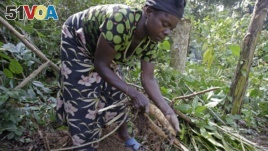03 June, 2013
51VOA听写整理,转载请注明出处。文本仅供参考,水平有限难免错漏,欢迎纠错!
From VOA Learning English, this is the Agriculture Report.
Report says farmers in the eastern part of the Democratic Republic of Congo are protecting against crop theft in an unusual way. Aid workers say the farmers are growing crops that are less likely to be stolen.
The United Nations Food and Agriculture Organization regularly talks with farmers in the eastern DRC. It says in the past year, added insecurity has caused many farmers to grow crops they had not grown earlier.

Kwabo Batembo and her four sisters, unseen, clean Casava, a staple food, on the outskirts of the small village of Walikale, Congo, Sept. 18, 2010.
Guillaume Kahomboshi is a food security expert with the FAO in Goma. He says the peasants are struck by the way that wars here always seem to break out at harvest time. They are thinking the wars maybe just an excuse to steal their crops.
Mr Kahomboshi says, many poor farmers are changing the kinds of crops they grow to try to reduce the threat that their crops will be stolen. For example,he knows that most of the people in a territory near Uganda are starting to grow soya.
The territory is called Rutshuru. Mr Kahomboshi suggests this is because soya is not pleasant to eat until it has been dried and milled. He says the armed groups want food that is ready to eat. In addition, there is good demand for soya in Uganda, where it is milled and then used as an ingredient in biscuits and other processed foods.
Kahomboshi tells VOA that farmers in Masisi, another war-stricken territory west of Rutshuru, are switching to growing cassava.
Franck Muke is an agronomist at Goma University. He agrees soya is less likely to be stolen, but he's not so sure about cassava, known as manioc in Congo.
He says cassava is more of a risk because it is a staple food, and he has noticed that although cassava is not easy to pilfer, because it has to be uprooted and then dried and milled, it is often quickly pillaged.
However, the non-governmental organization Concern, which spoke with people in villages affected by ethnic conflict in Masisi, reported less theft of cassava than of other crops.
Years of war and ethnic conflict in parts of eastern Congo have divided communities, this means villagers' crops are as likely to be stolen by their neighbors as by the armed groups.
And that's the Agriculture Report from VOA Learning English, I'm Steve Ember.